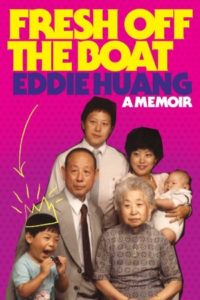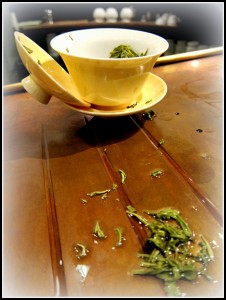
It starts with the food bullying that I feel I can relate to Eddie Huang‘s story. Cleverly, he begins the book with dimsum, so that got my interest, but he talked about dimsum for less than 2 pages. The food bullying though, where his classmates said that his food smelled bad, that he wanted the white kid lunches, that’s where my memories came back. The bully for me wasn’t in school and wasn’t by the kids. Comments, always by adults and mostly white females, that the food my mom made made the house smell bad, or the stuff I eat or drink that they haven’t heard of, much less tried, is “gross”, are this pet peeve of mine that I can’t forgive. Sure, they may not be intended to hurt me or anyone specifically, but they’re never well-meaning. They are too minute to confront the speaker about, so I have no way to tell the speaker that she’s disrespecting my whole culture. They are the papercut stings that you feel every time you wash your hands.
Eddie Huang and I don’t have anything in common, except we both being born to Asian parents. He grew up liking basketball, seeing himself in hip hop lyrics, doing drugs (and selling them), working in restaurant kitchens, getting in fights and juvenile in high school and probation in college. I grew up doing literature, math and science competitions. He lives in the East Coast. I live in Texas and the Bay Area. He is a celebrity. I am one of many of the model minority. Unlike him, I didn’t have classmates bully me for being Asian, because lucky for me, I wasn’t in America until late high school. In Vietnam, at least in those days, when you make good grades, your classmates don’t hate you, the cool kids are not the ones that play football or are in the cheerleader team (there’s no such thing as cheerleading in Vietnamese schools), and there’s no nerd that talks only about science or Star Trek in an annoying, obsessive way that makes a bad name for everyone who actually likes to study and get good grades. So at Humble High, I joined a group of class-loving friends at lunch, we sat by the library, then I went to college wanting to be a Physics professor. In American terms, I’m a big nerd. But I can’t feel one bit related to or represented by Sheldon in the Big Bang Theory. That show is a cheap attempt of boxing all science students and scientists into this inaccurate, overblown stereotype of what a scientist looks and acts like. Not a single real physicist that I know fits into the Sheldon box. However, a few students that I’ve taught, who make themselves fit into that box because they want to be scientists, fit the box like a cat. Shows like BBT make teenagers mold themselves into erroneous molds without ever knowing the correct mold, if there’s even one.
So yes, we shouldn’t fit ourselves into molds, and I’m a bit afraid of trying to fit myself into the Asian mold right here by relating to Edie Huang’s story simply on the ground that we’re Asians.
I feel worried every time there’s an Asian in the news, because most of the time only bad news make it into the news. When my mom saw the news about a drug dealer who happens to be Vietnamese American, she felt ashamed. When news about the Virginia Tech shooting and more recently, the UCLA shooting, came out with just the vague description of the shooter being Asian, I felt ashamed. Then I felt relieved that they weren’t Vietnamese, but still ashamed that they’re Asian. When Asian girls act promiscuously as if they’re trying to prove a point that they’re not the Asian-good-girl type, I feel ashamed. I feel ashamed for every Vietnamese who eats dogs or cats. Just fitting into the model minority image isn’t enough, I feel responsible for every action made by every Asian that doesn’t fit into that image. Why? Because I’m afraid that if we don’t fit into the model minority mold, they’ll make up another mold, a stinky-food-eater K-drama-watcher hip-hop-dancer-wannabe Tinder-hookuper mold, throw us all in, box us up and never let us out. I shouldn’t be ashamed though. Those people with actions that I don’t agree with don’t represent Asians (they don’t intend to represent anyone but themselves), they’re no more Asian than me, and certainly no less American than our presidents.
Yet, why do I feel such familiarity when Eddie Huang said that he felt at home at his friend’s house because he’s Filipino, that the American Thanksgiving dish that he liked the most to bring home to convince his mom of American food was green bean casserole (I think this is a pure coincidence, what culture influence can there be?). I see Kristen’s pen mark underlining every sentence that I feel related to, they must have resonated with her too, and that brings me comfort. Why do I like it when I take off my shoes at the door at Rashmi’s house (not because I enjoy the act of taking off shoes, but because Rashmi’s family is Indian, and we do the same at home)? Why do I like grocery shopping in Oakland Chinatown, just to look at the sauces, dried squid, rambutan, bok choy, sea cucumber, unidentifiable roots, Asian pears in styrofoam nets, when I don’t buy anything? The thing is, I feel comfortable seeing, eating, doing, thinking the stereotypical things that we see, eat, do, and think. Stereotypes are based on truths. Sure, one or two hundred people may deviate from the stereotype in one form or another, but 99% fit the stereotype for that form, and the 1% that deviate may actually fit the stereotype in another form. I’m not studying to be an engineer or a medical doctor, but I’m good at math. My parents don’t work in the restaurant business, but I love food (and still want to run a restaurant at some point). The stereotypes and our experiences with them, good and bad, connect us.
Publishers Weekly say “Huang reconfigures the popular foodie memoir into something worthwhile and very memorable”, and it makes me think they didn’t read past 20 pages of the first chapter. Labeling the book a foodie memoir is wrong. It’s not about food, Huang is not a foodie, and it’s not about him being a foodie. He’s a restauranteur, a popular food personality, a chef, but his memoir is not about his life in any of those jobs. It’s about him growing up in America and becoming successful as an Asian kid who didn’t fit (and didn’t want to fit) into the stereotypical image of Asian kids in America. It wasn’t like he was thinking the whole time, “oh I gotta be different, non-stereotypical”, either. He was just a kid growing up. Fresh Of The Boat is a coming-of-age nonfiction. He tells it as it was, real, unpolished, neither grammatically nor politically correct. He’s good at food, and he’s Asian, but neither is the whole picture. The point of the book is that he, just like everyone else, went through many experiences that a lot of us happen to be able to relate to. (The laughs are on you too, though, Eddie. You tried so hard to figure out what you were and you didn’t want to just take the easy path, conform and be typical, but you actually did everything a typical Asian does: you did your homework, you helped out at your family business, you cared about being a good student, you want your parents to approve of you, you went to law school, and as you pointed out in the book: you succeed by going into the restaurant business. Like you said, “You can take a Chinaman out the paddies, but he will still put MSG in all your food.” The difference is you’ve done other things too.)
You don’t have to be an American-born kid from Taiwanese immigrant parents to relate to the narrative. A lot of people can relate: immigrants, people whose parents used to argue a lot, kids who get bullied in school, smart kids, basketball lovers, hip-hop fans, kids who get into troubles, kids who have to stand up for themselves and their brothers, youngsters who sell drugs, people who work in the restaurant business, people who don’t care for pretentious labels, food, diplomatic talk, etc., college students who don’t see the point of fraternities. Fresh Off The Boat is so awfully relatable, that’s why it’s so good.
That’s not to say you’d be disappointed if you dive into this book looking for some yummy time. The food is the cornstarch in the sauce to bind his book together, as expected from an Asian, we tell stories and discuss business while we share foods. Huang shares his recipe on some meat, and there’s abundant talk of the night market in Taiwan and the shops to hit in New York. The food stuff doesn’t really start until page 190 though, and every sentence rings home: “… that summer in Taipei, I looked around and saw myself everywhere I went. Pieces of me scattered all over the country like I had lived, died, burned, and been spread throughout the country in a past life. Here I was coming home to find myself again in street stalls, KTV rooms, and bowls of beef noodle soup. All the things instilled in me from a young age by my family and home, rehydrated and brought to life like instant noodles. They never left, they just needed attention.” This is how I feel when I am in Chinatown in Oakland, the strip malls near the Lion Supermarket, the food courts in San Jose, and Japan.
It’s not all melancholy either. There are *many* funny comments, here are just a few:
[…] Chinese people don’t believe in psychologists. We just drink more tea when things go bad.
[…] Initially, my recipe was for Chairman Mao’s red cooked skirt steak over rice, but the network asked for something handheld. I didn’t get it and said that rice usually goes in a bowl. I mean, that’s pretty fucking handheld, but they didn’t go for it. So… I did what every culture does when Americans can’t understand something: I put it on bread. From banh mi to baos to arepas to Jamaican beef patties, it takes a little coco bread to make the medicine go down.
[…] Asians don’t use the oven for anything but holding Jordans.
And a few more that represent Huang’s current voice as he’s known for and what Kristen, I, and others who genuinely love food and not the Food Network or I-go-to-culinary-school-and-I’m-here-to-redefine/reconstruct/revolutionize-your-palate hipster version of food want to say but don’t have a voice to say:
There’s a difference between bastardizing an item and giving it the room to breathe, grow, and change with the times. When Chinese people cook Chinese food or Jamaicans cook Jamaican, there’s no question what’s going on. Just make it taste good. When foreigners cook our food, they want to infuse their identity into the dish, they have a need to be part of the story and take it over.
[…] The most infuriating thing is the idea that ethnic food isn’t already good enough because it goddamn is. We were fine before you came to visit and we’ll be fine after. If you like our food, great, but don’t come and tell me you’re gonna clean it up, refine it, or elevate it because it’s not necessary or possible.
White American chefs, if you had just got to “elevate” something, if you stay up at night thinking about what to “refine”, take it out on your food. Burgers, hot dogs, funnel cakes, apple pies, pumpkin pies, steaks, barbecue, baked potatoes, you’ve got tons to work with. If you say that your food is good as it is, which is fair, then what gives you the right to say that our food needs to be refined?
I love America. I really do. It’s my home now. When I’m out of the country, I miss it. I’m infuriated by the Vietnamese way a lot of times, and I like the independent, confident, I-do-what-I-do-and-don’t-you-dare-lecture-me American ways. I’m American, Vietnamese, both, neither, generic Asian, etc., the identities switch around so often, sometimes by choice, most of the time that’s just how things go with the first- and second-generation immigrants. I don’t have one fixed identity, and that’s fine, nobody does. I want to be American sometimes and I’m mad at America sometimes, but most of the time, I love the country, the way you can be yourself here, a lot of the people I met. Maybe I’m making a gross assumption here, but seeing that I agree with 60% of the book (the other 40% I don’t have a clue because it’s about basketball and hip hop), I think Huang the Book Writer does too (maybe not the other personas of Huang’s, but this one does). He gets it. Then he says it loud and clear. That makes me happy. So, American or not, FOB or not, you should get the book, not that the mad famous Eddie Huang could care less about you or I would get make a profit from this post, but chances are you’ll see your thoughts voiced out in there too.



Leave a Reply